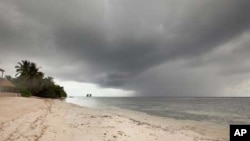Representatives from nearly 200 nations are gathering in Durban, South Africa for an annual United Nations conference on climate change. And while most parties agree on the need to tackle the issue, there remain vast disagreements over the methods.
One of the most pressing issues at the 17th annual Conference of Parties, known as COP17, is what to do with the soon-to-expire Kyoto Protocol.
This was a legally-binding pact between nations to reduce greenhouse gas emissions to at least five percent below 1990 levels.
The landmark 1997 agreement also established mechanisms allowing rich countries to offset their own pollution by investing in cleaner technology in poor nations.
A major topic of discussion at COP17 will be whether to sign on for a second commitment period.
Christina Figueres, the executive secretary of the U.N. Framework Convention on Climate Change, says delegates are looking for a middle ground.
“Our sense is that there is enough awareness that this is the year to make that decision. They have actually, over the past six months, governments have come to the realization that this is not a yes or no answer.”
The other options to extending the Kyoto Protocol are agreements made at the last two climate conferences in Copenhagen, Denmark and then last year in Cancun, Mexico.
There, countries agreed to new strategies to promote clean energy, including a $100 billion-a-year fund for developing nations and non-binding emissions limits.
Figueres says those measures still fall short.
“While those are efforts that go way beyond the Kyoto Protocol emissions reductions, they are insufficient," she said. "It is only 60 percent of the emission reductions needed to keep the increase of temperature to below two degrees Centigrade.”
Scientists have warned for years of the possible dangers of allowing average global temperatures to rise two degrees above pre-industrial levels. After that point, the Earth is at greater risk of floods, droughts and the loss of critical life systems.
Scientists blame carbon emissions as the leading cause of man-made global warming. So, it will be no surprise if all eyes at COP17 are on the United States and China - the world's two biggest polluters.
The United States never ratified the Kyoto Protocol, and has insisted that any legally binding agreement include all parties.
The top U.S. negotiator, Todd Sterns, denied that the U.S. is involved in a stalemate with China to act first.
“But I've also said with respect to a potential future legal regime, we wouldn't do it if all the major economies weren't also a part of it in quite a full way, so in that sense we would need to see that action from others," said Stern. "But I don't think it's that kind of - where we're waiting for China and China, well I can't tell you whether China is waiting for us or not, I can only speak for the United States, but I really don't see it that way.”
The United States does support the agreements finalized at COP16 in Cancun. Even though the terms are not legally binding, Stern says “nobody takes it lightly.”
Environmentalists are worried about the global consequences if countries cannot reach an agreement in Durban.
Ferrial Adam, the climate campaigner for Greenpeace Africa, says the United States, and it's reluctance to commit to emissions cuts, is a major obstacle.
“We're quite sure we're not going to achieve major agreements or a binding deal as we'd like to see," said Adam. "And that's very concerning because climate change is not going to wait for COP 18 or 19 or 20. These decisions need to be made now because the impacts of climate change are upon us.”
Adam added that governments need to “listen to the people more than the polluters.”
And there will be lots of people at the Durban conference, which opens Monday and runs for 12 days. According to the U.N., more than 24,000 people took part in the Copenhagen conference last year, including more than 3,000 members of the media.
Environmental groups and non-governmental-organizations will be sending thousands of observers to watch over the negotiations in Durban.
Durban Climate Conference: What's at Stake?
- By Gabe Joselow




